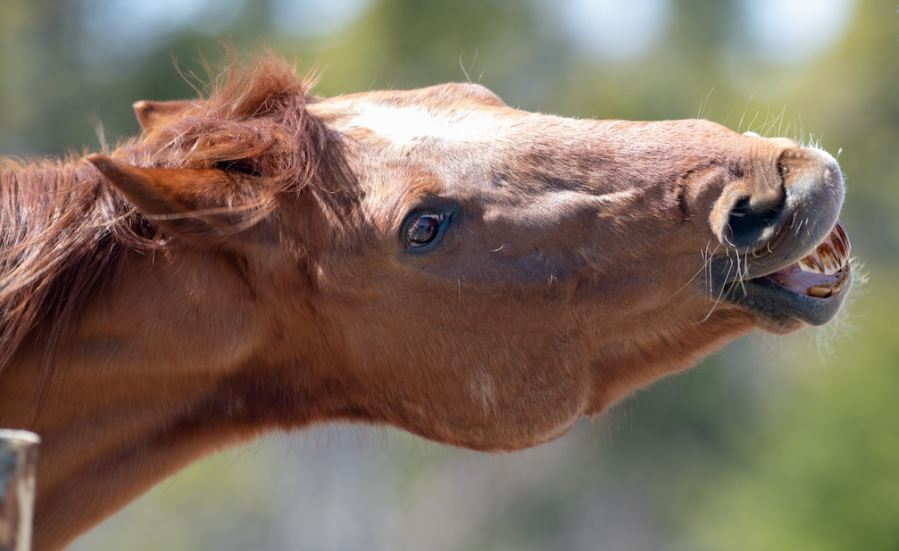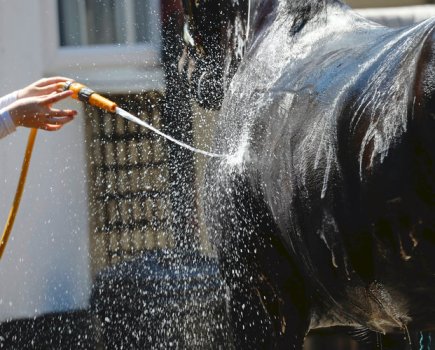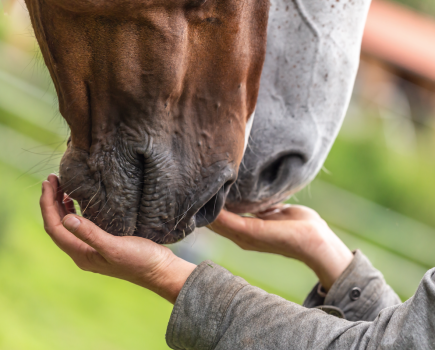There are a number of potential reasons why your horse might be biting and knowing what these are is key to working out how to stop a horse biting.
This sort of behaviour is very rarely linked to aggression, so it’s essential to understand why a horse is biting before you work out how to stop it. It’s easy to think they’re being badly behaved, but could they be in pain or feeling sore? It’s vital that you rule this out first.
Whether your horse is prone to biting or they suddenly start doing it, contact your vet for advice. You may also need to seek help from an equine dental technical, ACPAT veterinary physiotherapist and/or a qualified saddle fitter.
Once pain and discomfort has been ruled out, you can move on to considering whether diet, training or environment are the underlying cause of your horse biting.
Why do horses bite?
There are many reasons why horses bite, including:
- Being in pain
- Lack of interaction with other horses
- Discomfort due to equipment (for example, being too warm in a rug or disliking the girth being done up due to gastric ulcers)
- Misunderstanding of social cues between horse and human
- No ground rules set around food
- Lack of play (which quickly leads to boredom)
- Lack of exercise
- Lack of space (such as being stabled for long periods)
- Learnt behaviour
Hiding pain
Through my work at Blue Cross, I see around 200 horses per year. However, in the 13 years that I have been the charity’s Horse Rehabilitation Trainer and Behaviour Advisor, I’ve only ever come across four horses who have shown aggression, including biting, towards people without an underlying condition causing it.
In these cases, biting was a learnt behaviour that the horse had developed as a result of poor treatment.
When horses bite, they are trying to communicate something. Often that is pain, which is why I recommend consulting your vet as a first port of call.
Horses are stoic animals and so if they are in pain, it is the last thing they want to tell us. Instead they will try and mask it until it becomes unbearable, by which point they may communicate it through biting because we have touched a painful area.
Biting as play
In the wild, horses walk up to 30km a day. Most of us can’t replicate this for our horses living in a domestic setting, and so we have to introduce other stimulating activities and resources into their daily routine to ensure they are not getting bored.
Stabled horses who have little interaction with others might start biting as a method of play through nipping-type behaviours.
It is up to us as owners to ensure horses are turned out with other horses as much as possible, so that they are given the space and freedom to move and graze freely and regularly. If the fields are too wet and muddy, some time loose in an arena or a yard is much better than nothing.
Other ways to increase a horse’s movement and help to prevent boredom, besides riding, is lunging, in-hand hacking or groundwork exercises, long-reining and using a horse walker. The more time they are out of the stable, the better.
Dislikes something
A horse who is biting could be trying to tell you that they don’t like the equipment you are using. I once looked after a horse called Broma, who came to Blue Cross with a history of biting and showing aggression towards people. He started biting when we put rugs on him. As soon as we started trying to do up the front straps, he would bite around the front of the rug.
Rather than assume he was being naughty, myself and the team considered that he may have been trying to tell us he was already warm enough and felt uncomfortable wearing a rug. We stopped putting it on him, and he stopped biting.
Are they scared?
It is so important that you can understand your horse’s body language and facial expressions. When you can do this, you’ll quickly know to stop doing something that is making them feel uncomfortable.
Being prey animals, horses like to mask how they are feeling, but if you really watch them you will notice subtle signs. Look for things like changing their eye position, flaring their nostrils or pursing their lips.
This could be your horse telling you they are unsure and want you to stop doing whatever it is you’re doing. When we miss these signals, the horse’s communication will have to get ‘louder’, which is when biting might happen.
Horses are prey animals and a predator would naturally go for their legs. So if a farrier comes in and immediately starts picking up their legs when they are already nervous, it will feel like they are being restrained.
This might cause the horse to start biting as a defence mechanism. Correct and consistent training is important in this scenario.
Go back a few steps and give them a treat or a nice stroke when the farrier arrives, allowing them to establish a bond first. Practice with other people picking up and holding the horses legs, not just you.
Breaking down the process helps to avoid any unwanted behaviour like horse biting escalating.
Biting for food
Horses have been domesticated for around 6,000 years. This sounds like a long time, but it’s actually very short and they still behave similarly to their wild ancestors who were used to having to search for their food.
Subsequently, horses are extremely motivated by things that are edible.
These days, however, they do not have any restrictions on their food intake because we top it up or treat them for good behaviour.
They have learnt when and how to get food and will sometimes nuzzle our pockets for more. Small horse breeds and ponies are particularly known for biting because they know where the snacks are. They aren’t silly!
It is important to set clear ground rules around food. Clicker training can be really useful, as we can click and treat to reward the behaviour we want more of and ignore the behaviour we do not want more of, such as nuzzling our pockets.
Remember that horses should be eating for around 16-20 hours per day, so they should also have constant access to forage such as grass or hay in order to help them fulfil their desire to eat.
When they don’t have this, they are more likely to go and hunt for food from places they shouldn’t.
Could they be frustrated?
Another reason for a horse biting might be due to frustration. We had a two-year-old horse called Ace come into us who was known for biting and chasing people in the field.
However, when we looked at his management, we discovered that he hadn’t been castrated and he was only ever turned out on his own, as well as being stabled at night.
This horse was biting because he was bored and wanted to play. He had a lot of energy and he needed a way to use it.
Once he arrived at the Blue Cross, we gave him friends as well as the opportunity to move and play more. Within a week, he had completely stopped biting. This was even before he was castrated, which we did later on.
Natural behaviour
It is very rare to see aggression such as biting when horses are living in a natural setting because grazing, space and companionship are plentiful.
Having said that, horses in the wild will show dominance over another horse through aggressive behaviour such as biting and kicking. Fighting stallions in particular may rear and clash with their front legs, teeth bared.
In a domestic setting though, if you buy several horses separately and then ask them to live together, not all horses naturally get on well.
It’s rather the same as with people — we don’t all like everyone! In this scenario, horses biting each other could be due to play, but it could also be due to the fact that they don’t want to be friends.
If they don’t have enough space to move away from one another, they may start biting and/or kicking to tell each other to stay away.
How to stop a horse biting
Find the cause
The only way to stop a horse biting is to work out what is causing the behaviour. By removing the trigger, you will solve the behaviour. Sometimes it is a long journey (particularly in the case of learnt behaviour/bad habits), but it is possible.
Read their body language
Before behaviour escalates to biting, horses will use slighter forms of communication, such as flicking an ear back or scrunching their nose or eyes to communicate that they need distance. Look out for this and you may solve a problem before it starts. Horses are very skilled body language readers, in both each other and people. This is why it so important to be able to read your horse’s body language and learning what is normal behaviour for them.
Seek help
If you have ruled out a medical cause and don’t know how to stop your horse biting, I suggest contacting a registered clinical equine behaviourist to help. Once the root cause has been determined and the horse’s needs have been met, any biting should stop.
Main image © Shutterstock









